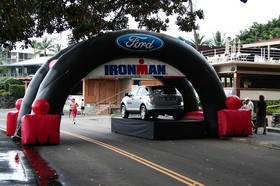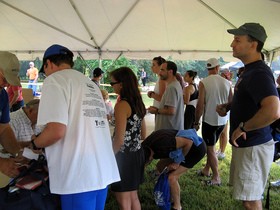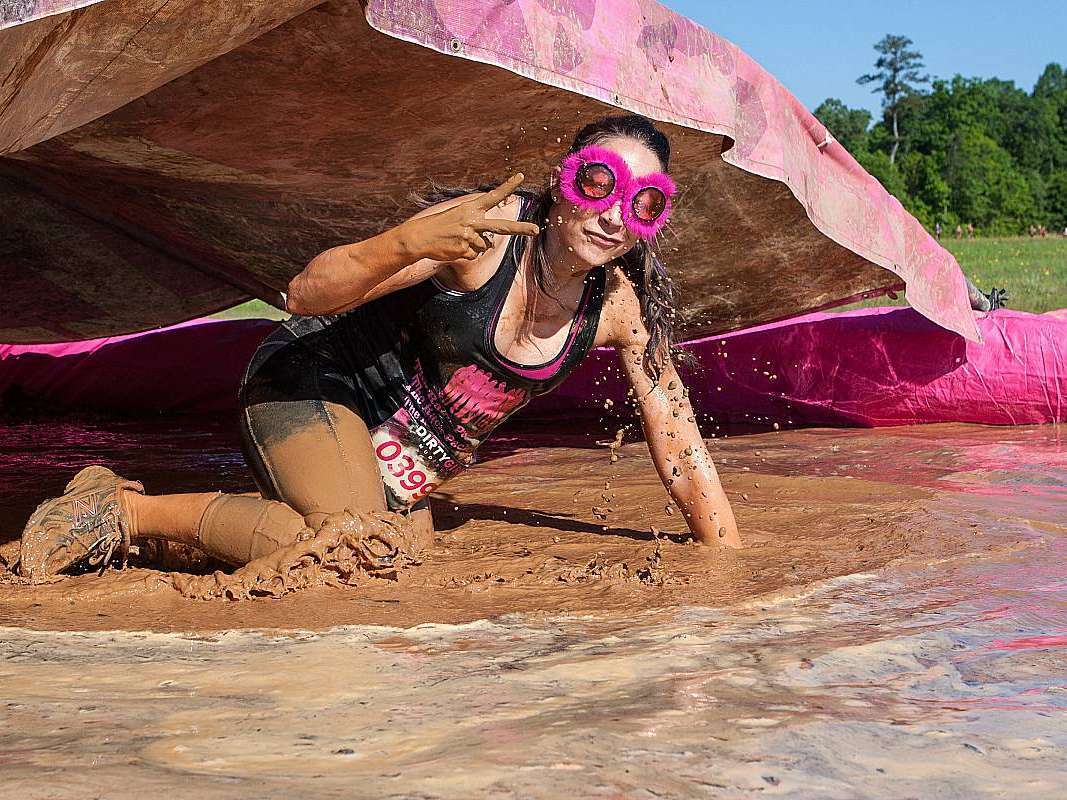 The crown jewel of the sport of triathlon is the Ironman Triathlon – 2.4 mile swim, 112 mile bike, 26.2 run.
The crown jewel of the sport of triathlon is the Ironman Triathlon – 2.4 mile swim, 112 mile bike, 26.2 run.
Many of the most popular Ironman races and venues fill up in less than 60 minutes.
Most triathletes of every stripe at least flirt with the idea of doing the Ironman.
It’s contagious.
It’s quite a phenomenon that it’s actually trendy now for people to want to subject themselves to this torture.
People want the tattoo, or at least the finisher metal.
We imagine updating our Facebook status as follows: “Susan is recovering from yesterday’s IRONMAN triathlon.”
So the 2 main questions are:
Should you even consider doing an Ironman?
Are you ready for an Ironman?…
Should You Do An Ironman?
There is no one-size-fits-all answer.
Every triathlete is different, and there are all kinds of factors that uniquely influence one’s decision to do an Ironman and one’s level of preparedness.
What follows are some guidelines that will hopefully help you determine whether or not you should be doing an Ironman for yourself.
Here’s how I would approach this question:
#1 Revisit YOUR triathlon motivations and goals.
- What was the motivation leading you to begin training and competing in triathlons?
- Was it to lose weight?
- Was it to reap the benefits of cross-training and being in peak physical condition?
- Was it to challenge yourself to achieve something outside your comfort zone?
- Was it one of those turning-40 goals? If so, why is it necessary that you do an Ironman triathlon?
 Don’t be talked into doing an Ironman by the pressure of Iron snobbery. Yes, that’s right: Iron snobbery. If you’ve been around the sport long enough, you meet those who automatically categorize you as a second-rate triathlete if you have not done an Ironman.
Don’t be talked into doing an Ironman by the pressure of Iron snobbery. Yes, that’s right: Iron snobbery. If you’ve been around the sport long enough, you meet those who automatically categorize you as a second-rate triathlete if you have not done an Ironman.
It is fine if your goals change and you decide on doing an Ironman, even if it wasn’t an initial motivation. My point is, don’t be pressured into it. There are an endless number of reasons to remain an active triathlete without having to do an Ironman. It is not required.
#2 Don’t do too much too soon.
So, you have one season of Sprint distance and Olympic distant triathlons behind you. Now it’s your second season: Ironman time! Why? Is that the only progression that has any value?
Why not a few seasons with a short-course focus and setting goals to improve how fast you can get? Perhaps include one half Ironman race each year, and strive to improve your time with each one. If you’re highly competitive, why not try and work your way up your age group standings? How about a couple top 10 or top 3 finishes?
Don’t buy into the theory that the Ironman must be a season 2 or even season 2 event. Who says? Maybe it’s a season 4 or season 5 achievement.
#3 Consider the cost.
Let’s be realistic here. It takes a significant commitment of time, energy and resources to train and compete in an Ironman. It would be akin to starting a new part-time job, and perhaps even more. It would be no stretch of the imagination to say that training for an Ironman becomes your life or at least a primary focus of it.
I knew plenty of triathletes who could do an Ironman if they set their mind to it, but they realistically know they don’t have the time, energy and resources to devote to it. Believe it or not, many triathletes have other goals and priorities in their lives, some of which pull rank on their triathlon goals.
Many Ironman triathletes report that it is common to be training 15 to 18 hours a week, with peak training periods up to 30 hours a week. If you’re starting at ground zero, the financial cost of training and competing in an Ironman triathlon ranges from $8,000 to $35,000, depending on whether you are a budget athlete or a big spender.
#4 Turn triathlon into science.
 The sport of triathlon is to be enjoyed, but if you are going to make the commitment to train and compete in an Ironman, you can’t afford to mess around and train ineffectively.
The sport of triathlon is to be enjoyed, but if you are going to make the commitment to train and compete in an Ironman, you can’t afford to mess around and train ineffectively.
Your triathlon training plan needs to cover all the bases encompassing a host of matters related to swim, bike and run conditioning, strength and flexibility training, endurance nutrition and triathlon gear.
Many triathletes decide to incorporate a triathlon coach in their quest to do an Ironman. Others identify a training partner, purchase a specific Ironman training guide, attend triathlon camps, or train with a triathlon club.
For the self-coached triathlete, a couple well-known triathlon training books include: The Triathlete’s Training Bible, and Going Long.
Bottom line: you must plan the work, and work the plan. Dropping the ball on either side will significantly decrease the likelihood of you doing an Ironman.
Are You Ready For An Ironman?
So, the question remains of how to know if you are ready to do an Ironman. There are a few ways to break this question down.
The first factor would simply be if you are ready to even start seriously training for one. It is physically dangerous, but humanly possible, to go from couch potato to Ironman in 12 months. It’s very risky. I wouldn’t encourage it.
A person needs to be fit before launching into an Ironman training program. What is “fit?” It is recommended to have
a training base of 6 to 8 hours a week for 6 months minimum before beginning an Ironman training plan.
Some other readiness factors include:
- Reasonable emotional/mental health
For example, deciding on a whim that you want to do an Ironman to deal with a recent divorce or as a function of an eating disorder or because you want to run or hide from something in your life is not advised. Training and competing in an Ironman triathlon is going to expose your weaknesses, not allow you to hide from them. Being in a good and healthy place emotionally is a big advantage.
- Having a support system
If your spouse and family resent you training for an Ironman, you might want to reconsider charging ahead without addressing it. Training and competing in an Ironman is a family effort. The time, energy, and cost affect everyone around you, especially those closest to you. If you are accustomed to accomplishing most things as a loner, think twice before applying this mentality to Ironman training. It will make a huge difference to have the understanding, support and encouragement of family or a few good friends. It helps to celebrate the victories and overcome the disappointments with people who are 100% behind you each step of the way.
- Triathlon race experience
Regardless of how superior your level of fitness or endurance base is, you want to have several triathlon competitions under your belt before attempting an Ironman. For example, doing 3 to 5 half Ironman triathlons would be a tremendous benefit. Doing so gives you valuable race experience in key skill areas such as open water swimming in competitive conditions, transitions, energy management, and mastering the skill of riding in the aero position down on your aero bars. The experience of encountering and overcoming specific race challenges, as well as dealing with the unexpected situations that inevitably pop up on race day, will help build confidence.
Signing Up For Ironman Events
Let’s say you feel ready and prepared to do an Ironman triathlon. A remaining question would be which Ironman race you choose to compete in.
If you want to do one of the official Ironman races (Arizona, Coeur d’Alene, Lake Placid, Canada, Louisville, Wisconsin, Florida), you’ve got to sign up quick. Online registration for the following year’s race usually begins the day after this year’s race and, in some cases (i.e. Lake Placid, Canada), sells out within hours.
 Another option is to show up to watch or volunteer at this year’s race, then stick around until the following day when on-site registration for next year’s race begins.
Another option is to show up to watch or volunteer at this year’s race, then stick around until the following day when on-site registration for next year’s race begins.
To find schedules and registration information about Ironman races, go to Ironman.com or TriFind.com.
There are also what’s commonly referred to as “Indie Ironman” races, which are Ironman-distance triathlons but are not part of the official Ford World Championship Series. You can explore the options at IronDistance.com. These Ironman races are a easier to get into, less expensive, and a little more low-key on the hoopla scale.



